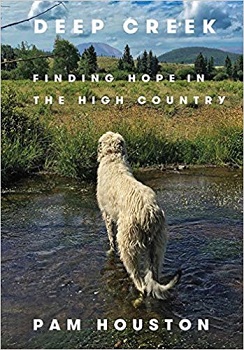Deep Creek: Finding Hope in the High Country by Pam Houston
Pam Houston was 31 years old when her first book, a collection of short stories titled Cowboys are My Weakness (1992), was published to some acclaim, earning her a check for $21,000—a lot of money for someone who was living in a tent and could fit all her belongings in her Toyota Corolla.
During the book tour for Cowboys, Houston looked for a place where she might want to use this money to settle down. She even came to Bellingham. But it was when she arrived in Creede, Colorado, met at the edge of town by a sign announcing a population of “586 nice folks and 17 soreheads,” that she knew she had found home nestled in the San Juan Mountains.
Deep Creek: Finding Hope in the High Country is a love letter to the 120-acre ranch that by several small miracles became hers with that $21,000. In her memoir told in linked essays interspersed with almanac entries about seasonal life on the ranch, Houston explores her traumatic childhood, small-town life, animal husbandry, climate change, and how to survive harsh winters and wildfires.
A horrific childhood at the hands of deeply narcissistic, alcoholic parents and an emotionally/physically abusive father made it difficult for her to trust enough to put down roots. The ranch and surrounding mountains offered Houston a place of safety and protection for the first time and inspired a daily gratitude despite the painful path that preceded it.
Because her childhood was so unpredictable, change had been a constant companion for Houston, so the regular pace of the ranch was both a challenge and a comfort. Fences need to be inspected and mended on a seasonal schedule, wood for winter heat chopped and stacked, hay stacked in the barn, chickens fed and eggs gathered.
Her two Irish wolfhounds, William and Fenton, are constant companions, as well as an assortment of horses, miniature donkeys, and Icelandic sheep; relationships that help her to understand what it means to be responsible and accountable to other living beings.
Fires that burned most of 100,000 acres of forest in 2013, right up to the edge of the ranch, inspire the essay entitled “Diary of a Fire” that laments human’s role in climate change and the seemingly irreversible devastation we are causing the planet.
Despite this planetary deterioration, Houston finds reasons for hope and the courage to be honest about our role in the damage. “And even if the jig is up,” she writes, “even if it really is game over, what better time to sing about the earth than when it is critically, even fatally, wounded at our hands.”
Deep Creek provides an emotional roadmap for how to simultaneously feel grief about our beaten-up world (and the role we play as damagers) and wonder at the beauty that remains.
If you haven’t read Houston before, but enjoy the writing of Cheryl Strayed (author of Wild) and Lidia Yuknavitch (author of the memoir The Chronology of Water), you may want to add Deep Creek to your TBR list.
Lisa Gresham is the Collection Services Manager at Whatcom County Library System. Find more reading recommendations at https://www.wcls.org.
(Originally published in Cascadia Weekly, Wednesday, March 13, 2019.)

